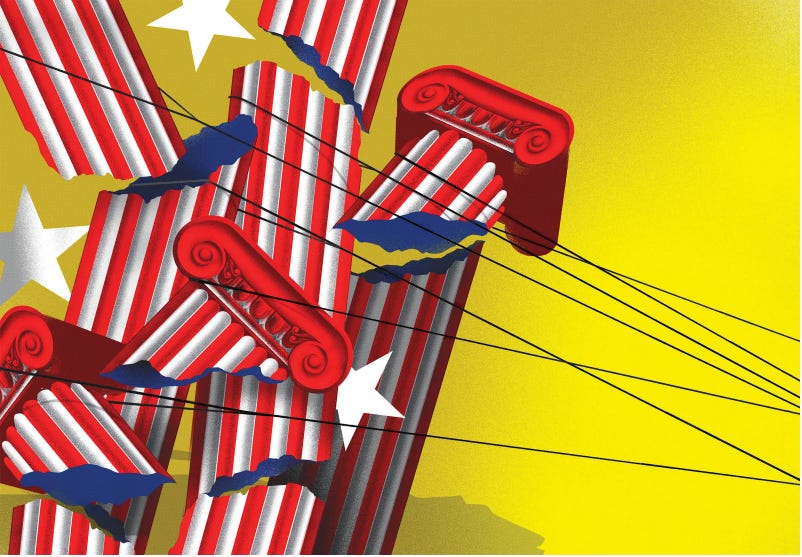It's so good having a discerning editor choosing interesting things to read. It used to be called a "magazine".
Dennis Glover
Help me back independents saying ‘enough already!’
I sent you a short note yesterday urging you to help me support one of the independents.
You’ll have to endure one or two more prompts like this! Here’s what Jason Falinski, (the sitting member being tackled by the independent I’m supporting) thinks you should do with your money — unless you donate it to his campaign of course!
I just think it is an immoral use of money; we have real problems in the world and for these guys to be spending $2 million against members of parliament, when, according to them, they agree with their member profiles, is just immoral.
Major article on the new, Thiel backed right
I had this earmarked to read and report to you. But I’ve run out of time. Fortunately Helen Lewis, an interesting substacker has read and reported on it, and, from what I’ve read of these folks before, I expect I’ll agree with her analysis. And perhaps you will too:
My main takeaway is that these people remind me of the bad Mitfords: politics is about being edgy and interesting more than anything else. … They find strongmen leaders kind of … dangerous and sexy, much like Unity and Diana found Hitler’s absolute power thrilling and erotic. And like the Mitfords, some of these guys seem quite naive about what an authoritarian takeover actually means (spoiler alert: the life expectancy for senior lieutenants is often not-great). It will be the world’s bleakest joke if America falls into authoritarianism because some nerds wanted to look cool; as I’ve written before, modern political journalism has to wrestle with the fact that people can be simultaneously cringe, ironic, semi-self-aware and dangerous.
And here’s a podcast interview with the author in which he makes a huge meal of the fact that he doesn’t editorialise throughout the piece. Why? Not because generally speaking it’s bad journalism, but because those he was reporting on said he’d editorialise and he wanted to prove them wrong. If you asked me what I thought of this, I’d tell you that I found it passing strange. But there’s a good chance you wouldn’t ask, which is as it should be.
Helen Lewis’s substack
While I’m on Helen Lewis, she produces a regular substack a bit like mine, but more literary. Highly recommended. Here’s the last entry of nine this week.
That reminds me: I’ve been meaning to link to this NYT interactive on Auden’s Musee des Beaux Arts, written on the eve of WWII.
About suffering they were never wrong,
The old Masters: how well they understood
Its human position: how it takes place
While someone else is eating or opening a window or just walking dully along;I love this poem, and I think it explains why the internet drives so many people mad—it’s a reminder that you are not, in fact, The Main Character, and that while you’re in terrible emotional pain, other people are having a sandwich.
Henry Ergas on the decline of Democracy as a religion
[In revolutionary France] he act of voting was the crucial tie between the individual citizen and that ill-defined entity, the “sovereign will of the people”. What was in dispute was how that will should be expressed.
For the Jacobins, who saw the world through the lens of classical antiquity, voting was an inherently public process in which each member of the demos bore the personal responsibility that justified the right to vote. But as the opportunities for intimidation and corruption that approach offered played themselves out, the Jacobins’ moderate opponents got the upper hand, with the constitution of 1795 stating – in the first official use of the term – that “all voting will be conducted by secret ballot”.…
The natural analogy, which soon became widespread, was to the solemnity of the confession …. It is therefore unsurprising that the great French social theorists of the 20th century’s first decades considered the increasingly formalised election rules sweeping the world as forming part of a secular religion, mandated by the ever more powerful modern state.…
And just as conventional religions seemed solid until they began to unravel, so this religion would collapse once its magic started to fade. At that point, other, less benevolent, gods might take its place – or in the anomie of disenchantment, the public could degenerate into clashing mobs, eventually abandoning the polls altogether.
Anzac and anthems
The Anzac day AFL game reminded me again how much I dislike the Australian national anthem and like New Zealand’s one — which I wrote about a while back. Oh and the tune of the Dutch national anthem is wonderul.
Navigating the faultlines of culture wars
This tweet by Jay Rosen alerted me to a fascinating article by a political journalist.


It’s a fascinating article by a classy writer:
Readers agreed with [people attacking his reporting on the racial makeup of a politician’s audience], and they have generously shared their thoughts and feelings with me online, calling me a racist Justin Trudeau fan and things that are even worse, if you can imagine that. …
What is happening here, if we assume good faith on all sides, is that I have been misunderstood. I think I can sort it out. My comment had nothing to do with the “rightness” of the demographic makeup, but with the political ramifications of it.
Although he doesn’t like it — why is a question for another day — he does a good job of explaining the way political journalists cultivate a detachment from ideology, save for the ideology of savviness.
“Savviness is what journalists admire in others,” he writes. “Savvy is what they themselves dearly wish to be.”
Because I dearly wish to see myself as savvy, the idea that people would think I was making a moral judgement of Poilievre’s crowd seems absurd. That’s how partisans think, or activists. My role is to understand and describe what is happening.
“Prohibited from joining in political struggles, dedicated to observing what is, regardless of whether it ought to be, the savvy believe that these disciplines afford them a special view of the arena, cured of excess sentiment, useless passion, ideological certitude and other defects of vision that players in the system routinely exhibit,” Rosen writes. “The savvy don’t say: I have a better argument than you. They say: I am closer to reality than you.”
For better or worse, that is what I think.
How London couldn’t get enough of the oligarchs
A fine video on the subject — produced by the FT. Hard to imagine any of our newspapers producing something like this. Capitalism isn’t particularly good at culture and even worse at news and current affairs.
Great doco on Aristotle’s biology
This is a wonderful BBC documentary by biologist Armand Leroi who encountered Aristotle’s biology in a second hand bookshop in Athens and was captivated by how powerfully insightful it was. And yet Aristotle’s biology wasn’t just forgotten, but anathematised. The scientific revolution went gunning for Aristotle’s notion of things in the universe (including the universe) having a ‘telos’ which is an end or even a purpose towards which they tended through time. This notion was also shunned in biology, but that was less successful. How do you explain the extraordinary details of a hummingbird’s wings without some idea that the elements support the purpose of flying?
There’s also a marvellous part of the doco where Leroi argues (admittedly a little tendentiously) that Aristotle anticipates the very modern idea that biology is ultimately about the transmission of information. But it’s a great thought — and shows you the power of Greek philosophy and Plato’s idea of forms. (Aristotle disagreed with Plato on this, but his reasoning here seems pretty consistent with Plato’s theory of forms). Altogether great fun.
There’s also a BBC In our Time podcast.
As a short postscript I checked out Leroi on the net and found his beautifully written book on the subject. Then I found this article which explores the nature of art. Anyway, after I got to his aspiration that large databases of art allow us to turn art history into a ‘science’, I started to wonder what he meant. Then his first footnote tells us that:
Fans of continental philosophy and critical theory … will doubtless reject the very possibility. But they reside in the epistemological wilds where the writ of reason no longer runs. From now on, by “art history” I mean that part of it where rational argument and empirical evidence still hold sway. That part—still most of it, I think—is a lot like natural science.
So there you have it, another schoolboy philosopher who’s got it all figured out that because critical theory has bred all kinds of nonsense in contemporary humanities, that the fundamental contribution that continental philosophy makes to this question can be disregarded as obscurantism.
Those who survived the war, but not the peace
I recommend this short documentary from the ANU on survivors of war who returned home to endless trauma and suffering. I have set the video to start after various acknowledgements to aboriginal custodians of the land and to their shameful dispossession. It appears there is no limit to how many times such things are acknowledged. Given this, if you feel there might be some benefit to you, or others from a further rehearsal of these things, you should scroll back to the start of the video.
The video focuses on two soldiers. Hugo Throssell VC and “one of CBE Bean’s ordinary soldiers”, Private Fredrick Weir. My interest was piqued because I served on as a student representative on the Board of Campbell High School (I think it was) which Ric Throssell chaired. He was the son of Hugo and Katherine Susanna Pritchard. Hugo suffered not just from the war, but also from his own political commitment to socialism and pacifism arising from the war — and his marriage to Katherine. Ric was a lovely, civilised man who took a shine to me. He had a deeply sad countenance. He too had had his career ruined by his political sympathies — and perhaps his actions. Who knows where the rights and wrongs of it lie as a matter of public administration. Wikpedia’s portrait of him is worth a thousand words, though they also throw in the thousand words. Sic transit gloria mundi.
I have set the
Some optimism on technologies to mitigate climate change
The stand up economist
Yes folks, you haven’t misread that. There is such a thing. You can read his latest newsletter by clicking below. Just read the story on Betty at the end if you like.
Ukraine
Mark Hertling on why he thinks Ukraine will win
A few folks suggested I’ve been “bold” in some of my predictions accompanying the analysis I’ve provided on CNN regarding this conflict. Beyond tactical assessments, there are two primary reasons I’ve said Ukraine would win this fight. Here’s… why…. Reason 1: Conventional joint and combined arms operations are hard. Real hard. Exceedingly hard…. Doing so takes intense training of individuals in their specific skills, exercises that build the capabilities of interprofessional teams who pull those skills together, the understanding of complex equipment & doctrine, communicating intent…and great leadership…. All this takes time, determination, and repetitious training… develops develops teamwork, trust, loyalty, and camaraderie. Good militaries understand all this, and good military leaders ensure it happens…. Less-than-good militaries put conscripts under arms, field equipment with inherent faults, and allow corruption…. The second reason I’ve been bold is because I had the chance to see how seemingly small things contribute to big failure…. I was assigned as the Commander of the Operations Group… at our Army’s National Training Center… fight[ing] mock battles against a tough opposing force for a couple of weeks…. Good units polish their good things, fix their bad things, and the battle resumes. After three weeks units and their leaders are darned good. Not-so-good units don’t accept critiques, don’t fix broken processes, repeatedly allow small issues to turn into big problems, and don’t reflect on their own leadership failures…. A few years after serving at the NTC, and after a combat tour, I was assigned as a new Brigadier General to command the Army’s European training center at Grafenwoehr Germany…. U[kraine ]A[rmy] trained there & soon had their own training center at Yavoriv…. The few times I observed the R[ussian] army in training and exercises, or talked to their leaders, they didn’t seem to be “good units.” Comparing the 2 armies-even w/ seemingly different quantity of equipment-the expectations seemed obvious…. I’ll again be bold in saying Ukraine will persevere. I hope that isn’t seen as hubris, it’s just an assessment based on my bias about who will best face the challenges of combined arms warfare & which is the learning Army …
HT: Brad Delong

From cousin Lawrence
From my cousin Lawrence Weschler who sends out a fortnightly substack.
Ukrainian soldiers reenacting a famous war painting
The scene they’re reenacting involves writing the enemy as follows. For context the men in both images have just won a battle, but their enemy continues his demand for their surrender (I doubt this is a contemporary translation!):
O sultan, Turkish devil and damned devil's kith and kin, secretary to Lucifer himself. What the devil kind of knight are you, that can't slay a hedgehog with your naked ass? The devil excretes, and your army eats. You will not, you son of a bitch, make subjects of Christian sons; we've no fear of your army, by land and by sea we will battle with thee, fuck your mother. You Babylonian scullion, Macedonian wheelwright, brewer of Jerusalem, goat-fucker of Alexandria, swineherd of Greater and Lesser Egypt, pig of Armenia, Podolian thief, catamite of Tartary, hangman of Kamyanets, and fool of all the world and underworld, an idiot before God, grandson of the Serpent, and the crick in our dick. Pig's snout, mare's ass, slaughterhouse cur, unchristened brow, screw your own mother! So the Zaporozhians declare, you lowlife. You won't even be herding pigs for the Christians. Now we'll conclude, for we don't know the date and don't own a calendar; the moon's in the sky, the year with the Lord, the day's the same over here as it is over there; for this kiss our ass!
More on the Oxford philosophical women
This is a rather trenchant review of the two books on the four women — which I’ve covered before — arguing that the two books do not bring off their claim that the women were a ‘school’. I think she takes things rather literally, and reads things against the grain. But there you go — as they say on Fox News “We report, you decide”. And here’s the conclusion to the article:
These four women did not bring philosophy back to life from the death grip of logical positivism, nor did they bring about a philosophical revolution in ethics. We do not need to make these grandiose claims in order to justify paying attention to their lives. We need only notice that we are still held captive by a picture of philosophy as a competitive endeavor, where great minds do battle with one another in order to attain intellectual dominance. That we still tend to fetishize the solitary genius who struggles to figure out the truth largely on his own, like Descartes in front of the fire, or Wittgenstein in his cabin. What is so powerful to me about the story of these four women is the fact that they model a different way of doing philosophy. On this model, philosophy is not a battle at all, but something that is cooperative and dialogical—pursued and enjoyed together. If these four women were up to something, if there was a way of doing philosophy that they all shared for a time, it is that they were doing it together—seriously, systematically, deeply and generously—as friends.
Pick up a free edition of the LRB
Meanwhile …















Some correspondence on my birthday
Hi Nicholas
Your reference to your birthday pushes me into wishing you a happy next thirty years against a pattern of the three segments of post-infantile life, each of roughly thirty years: the first segment of institutional roles, thirty years of learning and growing; the second thirty of doing and teaching; and a final thirty only now tending to take on a constructive role of volunteering and exploring which is gradually replacing mere leisure and conversation. At least that seems to me to be the character of the lives of those who leave the institutional framework, but continue to plug the holes in the existing institutions and reflect on the needs and possibilities they offer both to individuals and to movements.
Forgive me for offering a suggestion about your own orientation. You are rightly in revolt against the reductivism of most scientists, insisting that what matters is not just the minimal analysis of the components that conspire to form a complex, but the novel arrangements that produce complex entities which interact with entities of similar complexity to achieve activities that result in products that none of their components can recognise or affect.
It is only imaginative exploration of as yet unconfirmed possibilities in their service of needs that emerge obscurely that can finally produce such unobservable entities as electronic fields and gravitation, let alone such things as valid reasoning or purposive designs.
We lack any sensible understanding of processes that constitute our cultures, and the strengths and weaknesses of language and aspirations. Once we no longer are devoted to a role in a culture we should be able to some degree to step into a more enriched concept of its multiple aspects. Above all we can embrace the search for the precise workings of a variety of ever-increasing forms of products and their interactions rather than concentrate on how they can be represented minimally.
Yours
John Burnheim
Thank you very much for this John
It is remarkable. I turned 65 on Friday night and walking home from a restaurant where I went to celebrate with my wife and son (my daughter is in Canberra working on Jim Chalmers’ campaign) I rang an old friend I’d not spoken with on the phone with for some time and had a wonderful conversation. I told him I felt great and then blurted out with a shock of recognition that I was through with the bullshit — the bullshit and line toeing of the second third of one’s life.
A friend of mine who’d helped me with the application about six or so years ago for Chair of the Productivity Commission told me a few months ago that he thought it was a great mercy I didn’t get it. … I’d have been miserable and basically wasted my breath banging my head against a careerist monolith of not just the organisation but what Curtis Yarvin calls ‘The Cathedral’ — the whole set up.
So it was that on the evening of my 65th birthday, the clock ticked over into the third phase of my post-infantile life. I feel grateful and capable of making a (modest) contribution of my own, rather than some imitation of someone else.
So I very much appreciate your email — indeed I feel blessed, which is not a word I’ve ever used to describe myself I think — and I’m not a believer in any simple sense.
I wonder if I can ask you a couple of questions.
If I send you a book or two can you read them, or is that a problem. As you’ll have noticed from my newsletter, I loved Metaphysical Animals and would love to send you a copy. There’s another book called “Gratitude” of 4 short essays penned by Oliver Sacks towards the end of his life — three after he got his terminal diagnosis.
However I can also send them as audio-books on Audible.
Please let me know and if it’s books, please send me your physical address.
cheers,
Nicholas
















